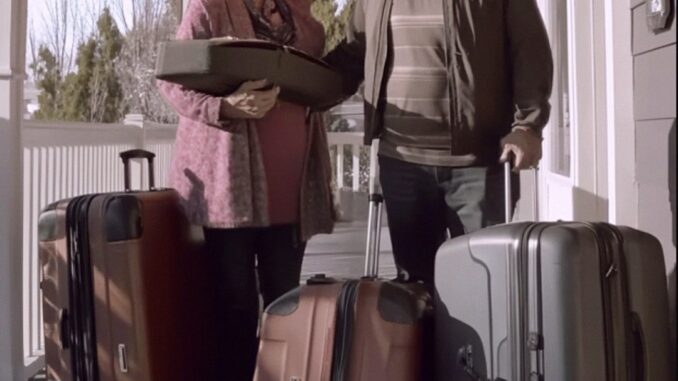
Tori’s life was shattered the day her parents walked out, leaving her and her two little brothers to fend for themselves. She could never have imagined that years later, just as she was piecing her life back together, they would show up at her door as if nothing had happened.
The memory of that fateful day was etched in her mind. Her father stormed through the living room, packing hastily. “We’ll call child services, and they’ll take care of you,” he barked coldly, as if they weren’t his children at all.
Six-year-old Lucas clung to her, his wide, fearful eyes searching for answers. “Tori, what’s happening?”
“I don’t know, Lucas,” she whispered, holding him tightly. “But it’s going to be okay. I promise.”
She was only 15, still a child herself, and powerless to stop what was unfolding. When the doorbell rang, her heart sank. It was Child Protective Services, just as her father had threatened. A kind-faced social worker gently explained that they were there to take her and her brothers somewhere safe. But there was no comfort in her words.
Lucas and Ben, only five, clung to Tori as they were separated, each loaded into different cars. Through the window, Tori watched her brothers’ tear-streaked faces disappear, her heart breaking into pieces.
The foster system was no refuge. Her new home was cold, both literally and emotionally. The Thompsons treated her as a burden, their indifference cutting deeper than any words. “Make sure you finish your chores, Tori,” Mrs. Thompson would say without even looking at her.
Loneliness and despair became her daily companions. She missed her brothers terribly, but visits were infrequent and, eventually, impossible. One day, she knocked on the door of Ben’s foster home, only to be met by a stranger. “They moved out last week,” the woman explained, pity in her eyes. “I’m sorry, I don’t know where they went.”
Tori sat on the steps, her promises to her brothers shattered. Tears streamed down her face as she realized she was now truly alone.
Life became a series of struggles. She ran away from her foster home multiple times, each escape attempt ending with her being dragged back. Eventually, she chose the uncertainty of the streets over the cold indifference of the Thompsons. She found refuge in an abandoned trailer and worked odd jobs to survive—cleaning cars, carrying groceries, even helping out at a diner. The work was grueling, the pay meager, but it was enough to scrape by.
Years passed, and Tori clawed her way out of desperation. A kind shop owner, Mr. Jenkins, noticed her diligence and encouraged her to go back to school. Bolstered by his words, she saved every penny she could and eventually enrolled in community college. It wasn’t easy—she juggled work and classes, often feeling overwhelmed—but she pressed on, driven by the promise she had made to herself and her brothers.
Her persistence paid off. After graduating with a degree in business administration, she landed a job as a store assistant. Through hard work and determination, she rose through the ranks to become the store manager. She finally had stability and a modest but comfortable apartment she could call her own.
Then, one evening, everything she had worked for was tested. A knock at the door revealed her parents—Charles and Linda—standing on her doorstep, suitcases in hand, smiling as if no time had passed.
“Hello, darling!” her mother said cheerfully, her tone grating in its familiarity.
Tori stared at them, her mind reeling. “Can we come in?” her father asked, his smile unshaken.
Still in shock, Tori stepped aside, watching as they made themselves comfortable in her kitchen. She brewed coffee, her hands trembling with barely suppressed anger.
After a few sips, her mother finally spoke. “We were hoping you could let us stay here for a while, just until we get back on our feet.”
Tori’s jaw tightened. “You want to live with me?” she asked, incredulous.
“Of course,” her father said smoothly. “We’re family. Family helps family, right?”
The words ignited a fire within her. “Family?” she snapped. “Where were you when we needed help? Where was this sense of family when you abandoned us?”
Her parents looked taken aback, scrambling for excuses. “Oh, Tori, that was a long time ago. Things were different then,” her mother stammered.
“Different?” Tori’s voice rose. “You left us. You threw us away like we didn’t matter. And now you show up, expecting me to welcome you with open arms?”
The room fell silent. Tori walked upstairs and retrieved an old ten-dollar bill her father had once given her—a meager attempt at kindness she had clung to as a child. She returned to the kitchen and handed it to him.
“Here,” she said coldly. “I hope this helps you as much as it helped me back then. Now, get out of my house and don’t ever come back.”
Her parents’ smiles faltered as the weight of her words sank in. Without protest, they gathered their belongings and left.
As the door closed behind them, Tori felt a strange sense of closure. The people who had abandoned her no longer had any power over her life. She was free.
Sipping a cup of coffee by her window, she gazed out at the world she had rebuilt for herself. Her journey had been painful and arduous, but it had shaped her into someone strong and self-reliant. The scars of her past would always be there, but they no longer defined her.
Tori was ready to face whatever came next—with or without those who had once left her behind.
Leave a Reply